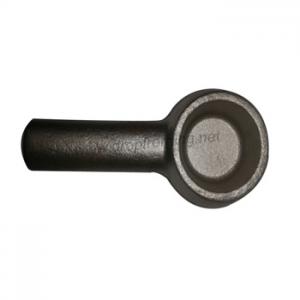Supplier: Drop Forging Manufacturers
Contact person: Ms. Cathy
Position:
Address: Zhenhai District,Ningbo,China
Country: China
Phone: 86-574-00000000 - Mobi:
Steel forgings
Price:
Steel forging is a drop forging process that involves applying compressive forces to a work piece to deform it, and create a desired geometric change to the material. The forging process is very important in industrial metal manufacture, particularly in the extensive iron and steel manufacturing industry. A steel forge is often a source of great output and productivity. Work stock is input to the forge, it may be rolled, it may also come directly from cast ingots or continuous castings. The forge will then manufacture steel forgings of desired geometry and specific material properties. These material properties are often greatly improved.
Steel forging is known to produce some of the strongest manufactured parts compared to other metal manufacturing processes, and obviously, is not just limited to iron and steel forging but to other metals as well. Different types of metals will have a different factors involved when forging them, some will be easier to forge than others. Various tests are described latter to determine forging process factors for different materials. Aluminum, magnesium, copper, titanium, and nickel alloys are also commonly forged metals. It is important to understand the principles of manufacturing forged products, including different techniques and basic metal forging design. The following will provide a comprehensive overview of the metal forging process.
Steel forging, specifically, can strengthen the material by sealing cracks and closing empty spaces within the metal. The hot forging process will highly reduce or eliminate inclusions in the forged part by breaking up impurities and redistributing their material throughout the metal work. However, controlling the bulk of impurities in the metal should be a consideration of the earlier casting process. Inclusions can cause stress points in the manufactured product, something to be avoided. Forging a metal will also alter the metal's grain structure with respect to the flow of the material during its deformation, and like other forming processes, can be used to create favorable grain structure in a material greatly increasing the strength of forged parts. For these reasons, metal forging manufacture gives distinct advantages in the mechanical properties of work produced, over that of parts manufactured by other processes such as only casting or machining.
Steel forging is known to produce some of the strongest manufactured parts compared to other metal manufacturing processes, and obviously, is not just limited to iron and steel forging but to other metals as well. Different types of metals will have a different factors involved when forging them, some will be easier to forge than others. Various tests are described latter to determine forging process factors for different materials. Aluminum, magnesium, copper, titanium, and nickel alloys are also commonly forged metals. It is important to understand the principles of manufacturing forged products, including different techniques and basic metal forging design. The following will provide a comprehensive overview of the metal forging process.
Steel forging, specifically, can strengthen the material by sealing cracks and closing empty spaces within the metal. The hot forging process will highly reduce or eliminate inclusions in the forged part by breaking up impurities and redistributing their material throughout the metal work. However, controlling the bulk of impurities in the metal should be a consideration of the earlier casting process. Inclusions can cause stress points in the manufactured product, something to be avoided. Forging a metal will also alter the metal's grain structure with respect to the flow of the material during its deformation, and like other forming processes, can be used to create favorable grain structure in a material greatly increasing the strength of forged parts. For these reasons, metal forging manufacture gives distinct advantages in the mechanical properties of work produced, over that of parts manufactured by other processes such as only casting or machining.
SEND INQUIRY
Please fill in fully your information to send email
CATEGORY














 Agriculture
Agriculture